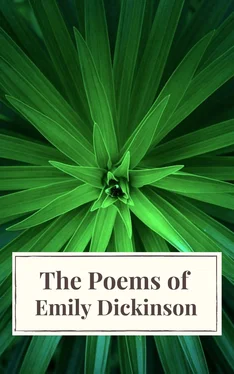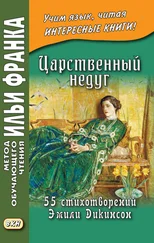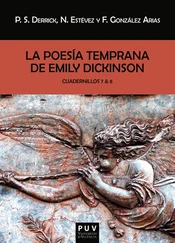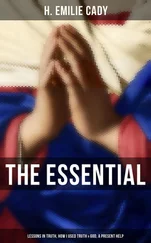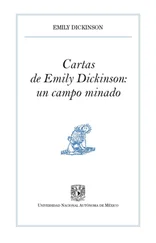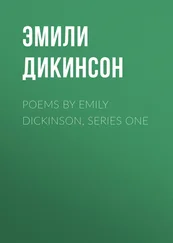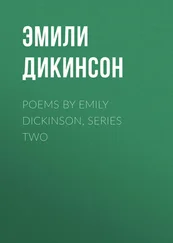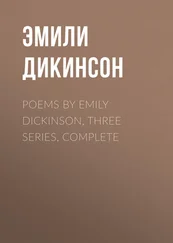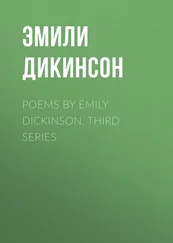I've heard the hunter tell;
'T is but the ecstasy of death,
And then the brake is still.
The smitten rock that gushes,
The trampled steel that springs;
A cheek is always redder
Just where the hectic stings!
Mirth is the mail of anguish,
In which it cautions arm,
Lest anybody spy the blood
And "You're hurt" exclaim!
IX.
The heart asks pleasure first,
And then, excuse from pain;
And then, those little anodynes
That deaden suffering;
And then, to go to sleep;
And then, if it should be
The will of its Inquisitor,
The liberty to die.
X.
IN A LIBRARY.
A precious, mouldering pleasure 't is
To meet an antique book,
In just the dress his century wore;
A privilege, I think,
His venerable hand to take,
And warming in our own,
A passage back, or two, to make
To times when he was young.
His quaint opinions to inspect,
His knowledge to unfold
On what concerns our mutual mind,
The literature of old;
What interested scholars most,
What competitions ran
When Plato was a certainty.
And Sophocles a man;
When Sappho was a living girl,
And Beatrice wore
The gown that Dante deified.
Facts, centuries before,
He traverses familiar,
As one should come to town
And tell you all your dreams were true;
He lived where dreams were sown.
His presence is enchantment,
You beg him not to go;
Old volumes shake their vellum heads
And tantalize, just so.
XI.
Much madness is divinest sense
To a discerning eye;
Much sense the starkest madness.
'T is the majority
In this, as all, prevails.
Assent, and you are sane;
Demur, — you're straightway dangerous,
And handled with a chain.
XII.
I asked no other thing,
No other was denied.
I offered Being for it;
The mighty merchant smiled.
Brazil? He twirled a button,
Without a glance my way:
"But, madam, is there nothing else
That we can show to-day?"
XIII.
EXCLUSION.
The soul selects her own society,
Then shuts the door;
On her divine majority
Obtrude no more.
Unmoved, she notes the chariot's pausing
At her low gate;
Unmoved, an emperor is kneeling
Upon her mat.
I've known her from an ample nation
Choose one;
Then close the valves of her attention
Like stone.
XIV.
THE SECRET.
Some things that fly there be, —
Birds, hours, the bumble-bee:
Of these no elegy.
Some things that stay there be, —
Grief, hills, eternity:
Nor this behooveth me.
There are, that resting, rise.
Can I expound the skies?
How still the riddle lies!
XV.
THE LONELY HOUSE.
I know some lonely houses off the road
A robber 'd like the look of, —
Wooden barred,
And windows hanging low,
Inviting to
A portico,
Where two could creep:
One hand the tools,
The other peep
To make sure all's asleep.
Old-fashioned eyes,
Not easy to surprise!
How orderly the kitchen 'd look by night,
With just a clock, —
But they could gag the tick,
And mice won't bark;
And so the walls don't tell,
None will.
A pair of spectacles ajar just stir —
An almanac's aware.
Was it the mat winked,
Or a nervous star?
The moon slides down the stair
To see who's there.
There's plunder, — where?
Tankard, or spoon,
Earring, or stone,
A watch, some ancient brooch
To match the grandmamma,
Staid sleeping there.
Day rattles, too,
Stealth's slow;
The sun has got as far
As the third sycamore.
Screams chanticleer,
"Who's there?"
And echoes, trains away,
Sneer — "Where?"
While the old couple, just astir,
Fancy the sunrise left the door ajar!
XVI.
To fight aloud is very brave,
But gallanter, I know,
Who charge within the bosom,
The cavalry of woe.
Who win, and nations do not see,
Who fall, and none observe,
Whose dying eyes no country
Regards with patriot love.
We trust, in plumed procession,
For such the angels go,
Rank after rank, with even feet
And uniforms of snow.
XVII.
DAWN.
When night is almost done,
And sunrise grows so near
That we can touch the spaces,
It 's time to smooth the hair
And get the dimples ready,
And wonder we could care
For that old faded midnight
That frightened but an hour.
XVIII.
THE BOOK OF MARTYRS.
Read, sweet, how others strove,
Till we are stouter;
What they renounced,
Till we are less afraid;
How many times they bore
The faithful witness,
Till we are helped,
As if a kingdom cared!
Read then of faith
That shone above the fagot;
Clear strains of hymn
The river could not drown;
Brave names of men
And celestial women,
Passed out of record
Into renown!
XIX.
THE MYSTERY OF PAIN.
Pain has an element of blank;
It cannot recollect
When it began, or if there were
A day when it was not.
It has no future but itself,
Its infinite realms contain
Its past, enlightened to perceive
New periods of pain.
XX.
I taste a liquor never brewed,
From tankards scooped in pearl;
Not all the vats upon the Rhine
Yield such an alcohol!
Inebriate of air am I,
And debauchee of dew,
Reeling, through endless summer days,
From inns of molten blue.
When landlords turn the drunken bee
Out of the foxglove's door,
When butterflies renounce their drams,
I shall but drink the more!
Till seraphs swing their snowy hats,
And saints to windows run,
To see the little tippler
Leaning against the sun!
XXI.
A BOOK.
He ate and drank the precious words,
His spirit grew robust;
He knew no more that he was poor,
Nor that his frame was dust.
He danced along the dingy days,
And this bequest of wings
Was but a book. What liberty
A loosened spirit brings!
XXII.
I had no time to hate, because
The grave would hinder me,
And life was not so ample I
Could finish enmity.
Nor had I time to love; but since
Some industry must be,
The little toil of love, I thought,
Was large enough for me.
XXIII.
UNRETURNING.
'T was such a little, little boat
That toddled down the bay!
'T was such a gallant, gallant sea
That beckoned it away!
'T was such a greedy, greedy wave
That licked it from the coast;
Nor ever guessed the stately sails
My little craft was lost!
XXIV.
Whether my bark went down at sea,
Whether she met with gales,
Whether to isles enchanted
She bent her docile sails;
By what mystic mooring
She is held to-day, —
This is the errand of the eye
Out upon the bay.
XXV.
Belshazzar had a letter, —
He never had but one;
Belshazzar's correspondent
Concluded and begun
In that immortal copy
The conscience of us all
Can read without its glasses
On revelation's wall.
XXVI.
The brain within its groove
Runs evenly and true;
But let a splinter swerve,
'T were easier for you
To put the water back
When floods have slit the hills,
And scooped a turnpike for themselves,
And blotted out the mills!
II. LOVE.
I.
MINE.
Mine by the right of the white election!
Читать дальше
